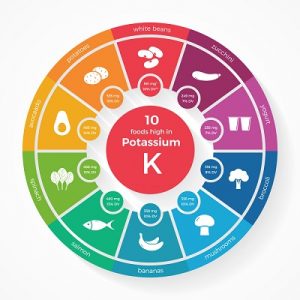 Potassium is an important nutrient found in many foods and plays a crucial role in our health.
Potassium is an important nutrient found in many foods and plays a crucial role in our health.
What Potassium Does
Consuming the recommended amount of potassium each day helps regulate blood pressure, enhance nerve functions, maintain fluid balance and helps facilitate muscle contraction.
Also, maintaining normal levels of potassium in the body regulates heart beats, and can reduce the risk of kidney stones and bone loss as we age.
In those who suffer from kidney disease, potassium levels can rise and affect healthy heartbeat. It’s important to talk with your doctor if potassium restriction is best for your health.
How Much Do We Need?
- Age 1 – 3: 3,000 milligrams a day
- Age 4 – 8: 3,800 milligrams a day
- Age 9 – 13: 4,500 milligrams a day
- Age 14 and older: 4,700 milligrams a day
- Women who are breast-feeding: 5,100 milligrams a day
Best Sources of Potassium
This high action mineral is found in most of our foods, but here are a few sources of potassium that have at least 400mg/serving!
Sweet Potatoes
Sweet potatoes are a delicious source of potassium and they are fairly light on the wallet as well. Surprisingly, sweet potatoes actually contain more potassium than bananas, which was likely your first thought.
One average sized sweet potato contains roughly 694mg of potassium. Sweet potatoes are also packed with fiber, good carbs, and beta-carotene, which are all essential nutrients that help support body function and prevent disease.
You can enjoy these sweet treats mashed, baked, fried, grilled, or even stuffed. The best part is, they are only 131 calories per potato!
All Varieties of Beans
Beans, whether black, pinto, or kidney are loaded with potassium. Packed with a whopping 600-mg/half cup, white beans contain the most potassium out of the bunch.
Soybeans are also high in potassium and come in a wide variety of products. You could eat them as a side dish, drink a cup of soymilk, consume a few slices of soy cheese, etc. Either way, there is roughly 500 mg of potassium in every cup of soybeans!
Beans also aid in heart health and contain large amounts of fiber. Add beans into your chili, as a side dish, or even to your salads!
Yogurt and Soy Dairy
Yogurt is another high source of potassium and actually contains around 625mg per 8oz, which is 18% of daily recommended allowance. Yogurts come in a variety of flavors, textures, and fat content, but, non-fat plain yogurt contains more than yogurt made with whole milk.
For those who cannot consume dairy products or just choose not to, yogurt made from soy milk is a great substitute that is still packed with potassium and full of flavor!
Yogurt is a delicious treat that can be enjoyed as is, with some fruit/granola, in place of whipped cream, and even as a mayo substitute in dishes, such as tuna salad or macaroni salad!
Clams
Bet that wasn’t what you were anticipating! We weren’t either, but there is actually 530 or so mg of potassium in 3oz of clams. This deliciously tender seafood is also packed with vitamin B12.
Enjoy clams straight out of the shell dipped in butter, thrown into a seafood salad, or tossed in with your linguini for a delicious Italian dish.
Molasses
Again, not the most common item to think of, but do not overlook this sweet, gooey treat! Molasses contains roughly 500 mg of potassium per tablespoon, as well as a fairly high amount of calcium and iron.
Molasses is commonly used in baked goods such as cinnamon buns, but is also a great alternative to sugar when used as a sweetener.
Squash
Squash is a winter vegetable that tends to be overlooked as a rich source of potassium, but, it is a wonderful vegetable that has a sweet taste and offers a variety ways to enjoy it.
Both winter squash and spaghetti squash have high amounts of potassium, roughly 450mg per half cup and are perfect for those on a diet.
Winter squash can be eaten grilled, fried, or baked while spaghetti squash (as the name suggests) is to be eaten like spaghetti! With just 50 calories per serving, squash is both nutritious and perfect for the calorie cautious!
Dark Leafy Greens
Spinach and other dark leafy greens, like Kale are rich sources of potassium. Spinach has the most with 167mg per 1 cup serving, which is, 5% of the daily recommended allowance.
Other greens include: Swiss chard at 27% DV, kale at 8% DV and collard greens at 6% DV.
Bananas
Finally! Bananas contain roughly 400mg of protein and are great for snacking or throwing in a smoothie!
Bananas are also perfect for satisfying hunger and are sure-fire metabolism boosters!
There are so many foods out there that are packed with potassium and taste absolutely delicious!
Try adding in some baked sweet potatoes with a side of spinach to your next meal or throw a banana into your favorite smoothie!
Be sure to add these potassium rich foods to your balanced diet.






